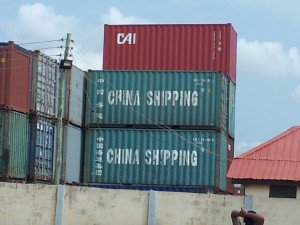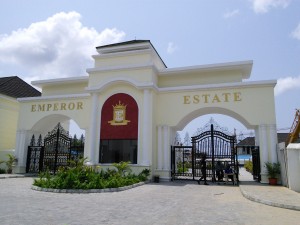Chinese economic presence in Africa comes in for a lot of criticism: the projects to which they contribute financing favor foreign companies while leaving local contractors behind – or so the critics say. The Chinese are also known for bringing in their own people to do the work. In Kenya, for instance, there has been a recent wave of Chinese immigrants who account for about 10,000 workers.

I met some Chinese managers during my short visit to Accra, Ghana. I have to admit that these conversations were revelatory to me. Why do they bring their own workers? One reason is that the Chinese don’t know how to manage Africans. The cultural differences are huge. To give you an example: many of the contracts are Government-related, and the Chinese feel the pressure to meet the deadlines. They expect their people to work 6.5 days/week to make sure the deadline is met. Africans are more relaxed about deadlines – too relaxed, as far as the Chinese are concerned!
Trying to learn a bit about China’s presence in Africa, I came across a report on China’s development aid to Africa. It was published about a year ago by the Center for Global Development. The report shows that Chinese investments in infrastructure projects date as far back as 1950. During the Cold War, China was eager to back Africa so as to counter the influence of the U.S. Since then, financial flows from China to Africa have come from both Chinese private businesses that expand internationally, and from state-owned companies that provide grants and interest-free loans to African countries.

China’s president visited Kenya last month. The aim of his visit was to promote ties between the two countries. As a result of this visit, 17 agreements were signed promising billions of shillings in the form of development funds. The project that received most media attention was the construction of the East Africa railway. Other projects include the establishment of the China-Africa Development Bank, the set-up of a China-Africa Research Centre, and projects related to ecological and wildlife protection.
After some bomb blasts in Nairobi a few weeks ago, the U.S. and the U.K. warned tourists about potential risks. Some travel agencies evacuated their customers, and some flights have been cancelled until November. A few days later, the Chinese government promised to take 17,000 Chinese tourists to Kenya. It looks like the Cold War type of allegiance still plays a role…
What comes to mind when you think about the Chinese presence in Africa?


Hi Africa, I paid a lot of attention on this post. Basic China national interests and strategic needs have been creating ties between China and Africa continent. There are three main factors very relevant that maintain relations between them.
China needs African resources to fuel its development goals, markets to sustain its growth and political alliances that support its position on the international scene.
The historic friendship between Africa and China is still very important. Over the last 50 years, Beijing has been politically solidary and helped the development of Africa. At the conference held in Bandung in 1955 for developing countries, China supported the sovereignty of African states and non-interference in their internal affairs.
Strategists and African leaders firmly believe that China experience and development model have big influence in African countries. Beijing considers that China and Africa share much more experiences than European countries or Westerners so they will continue supporting Africa as Africa supported them in the 70’s to join the United Nations.
Hi Jose Pedro, thank you for sharing this information with us. Africa’s development path looks closer to that of China than to that of the Western countries. The cultural differences seem to be quite significant, though.
On a different but related note, someone shared with me the following information about Chinese companies building cities in Africa: “One example is a city near Nairobi which will look like a second Dubai. The project, to be developed on land in Athi River, Machakos County, about 30km from Nairobi. It will be an economic zone for Chinese companies as a base to start internationalising within East Africa and will potentially create 200.000 jobs. Another example is Kilamba Kiaxi: a gigantic new sattelite city for 500 thousand people just outside the Angolan capital Luanda. The area is a copy of residential areas in Chinese cities like Chengdu or Xi’An.”
Any views on these developments?
I do not have specific information about it, but it seems China’s influence even designing way of life concepts is tremendous.